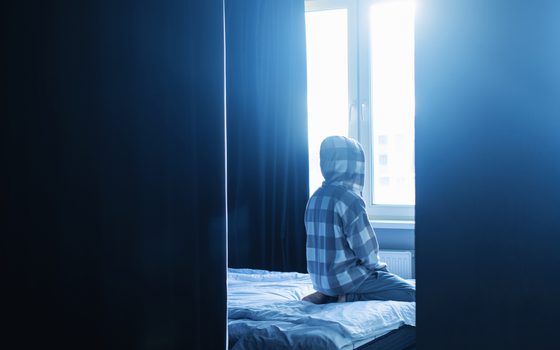Awareness of what?
It’s Mental Health Awareness Week – but there’s a national crisis that lies beneath the social media veneer
20 May 2020
This is an article from the upcoming second issue of the New Economics Zine. You can read the full issue here
Content warning: this article contains a brief mention of suicide.
Mental health ‘awareness’ has become a phenomenon over the past couple of years. From people sharing their experiences online to big companies espousing their commitment to ensuring the wellbeing of their workers and customers, there are few corners of the world left untouched. There’s a mental health awareness week, an awareness day, a day for talking, you name it.
Awareness and the erosion of stigma around mental ill health is obviously important. It means that people feel more able to talk to one another about the issues they’re having and it means not having to hide what often are quite serious periods of ill health. But the real question is: what happens when the stigma melts away and you feel able to go and seek support?
In the midst of a global pandemic, social distancing, and lockdown due to the Covid-19 crisis, more people than ever will need help, right now and in the months and years to come. Anxiety, uncertainty, loneliness, depression, complex grief — mental health services and charities will face a wave of new enquiries for help, on top of those who were suffering before coronavirus plunged us into turmoil. We have seen evidence that a sizeable number of people were presenting with severe mental health problems, such as psychosis, with no prior interaction with services, since the lockdown began. This is the tip of the iceberg of what is to come, and services need to be economically prepared to weather the storm.
“The real question is: what happens when the stigma melts away and you feel able to go and seek support?”
From the outside, the media attention around awareness — prior to the coronavirus crisis and right now — can make it look as though those who suffer from mental ill health now have everything they need in terms of support, treatment and recovery.
However, beneath the veneer, it’s a different story.
Six years ago, I was at a very low point and I decided to take my own life. I had a loving family and was in a great relationship but felt as though there was no point in living anymore due to the crippling depression that overtook me.
Thankfully, someone found me before it was too late.
But unfortunately, the support I received following this was as inadequate as the support I received before it. The police gave me a telling off and I was not signposted to services. I called my GP, who offered me a telephone appointment, and then told me to simply double my antidepressants.
To put it lightly, I felt pretty crap about the whole situation – as though it was an everyday occurrence for people to want to end their own lives and receive no sympathy for it if they happen to survive.
This opened my eyes to the reality of the situation. After my own recovery I decided to dedicate my working life to ensuring that no one else had to go through what I went through – and if they do, that they receive the help and care that they need and deserve. During lockdown, this mission of suicide prevention has become even more important, due to increased loneliness, isolation and dissolution of routine.
Today, I run a successful mental health charity – Chasing the Stigma – which has developed the UK’s go-to mental health signposting tool, the Hub of Hope, and a burgeoning workplace mental health training programme which provides basic training so people can signpost those in need to relevant services and urgent assistance.
Through the Hub of Hope we have signposted over 120,000 people across the UK to relevant mental health services near them. By combining tech and a simplistic approach, we have managed to make a huge difference in the mental health market by providing an accessible pathway to services. Since the lockdown, we have managed to move the Ambassador of Hope training programme online, to help organisations and colleagues provide support for each other as they work from home and on the frontline.
Most of the services on the Hub of Hope are charities. We have found that, like us, most of the organisations we work with are set up and run by those with a personal experience of mental health problems or illness – be it themselves or those close to them.
The fact of the matter is, we are having to use our own trauma and pain to spur ourselves on to improve services for others. Should this really be the case? Should we really have had to go through hell – and risk triggering our own issues – to ensure that no one else does?
This is something that the government – through the NHS – should be doing. It’s a national scandal.
Since the government announced social distancing and lockdown plans in late March, we have seen an almost 250% increase in traffic to the Hub. Many charities are desperately trying to alter their services, adding more online and telephone support, but they are struggling financially without the usual fundraising input. The London Marathon alone raises up to £66 million for charities each year — the loss of this event and other fundraising initiatives like it has created an economic black hole for many.
This is compounding the trauma, as people desperately scramble to provide vital and lifesaving services they are unable to realistically fund.
There is no such thing as mental health parity in this country. People with mental health conditions are still treated as second class citizens by the system – and that’s why we felt we had to launch a new campaign to highlight the disparity between words and actions.
“There is no such thing as mental health parity in this country.”
In October 2019, on the day after Mental Health Awareness Day, we launched Everyday. We wanted to highlight this gap between what is being said and what is actually happening, and remind people that mental health issues are not confined to one day of the year. Everyday, people struggle – and everyday, people work extremely hard and give their own time to help those who are in need.
From therapists to academics, psychologists to psychiatrists, paid charity workers to volunteers, these are the people who are putting their time and energy into tackling the mounting mental health crisis in this country. These are the people who we should be listening to – not a fancy social media banner designed by a marketing team to increase a company’s followers.
The message is more pertinent as services face increased demand. Many in the mental health sector have risked their lives with inadequate personal protective equipment (PPE) to continue providing inpatient and community mental health services to the most vulnerable and in need.
The issues all boil down to funding and access. Mental health services are scarcely funded compared to physical health, even with recent promised increases. The introduction of the IAPT (Improving Access to Psychological Therapies) services has indeed improved access for those suffering from mild mental health problems, but waiting lists are long, and navigating the referral process is can be overwhelming. To actually get an appointment requires a maze of tasks which put many people off before they’ve even reached a therapist.
The services are so overloaded that they can only cater for the most severe cases and the mildest – anyone who sits in the middle risks being left behind.
Eating disorders, thankfully, have their own dedicated pathway, but the wait is on average 18 months – and many are turned away after assessment due to not being ‘ill enough’ because the demand is so high. This also causes distress for practitioners, as they want to help but find that their hands tied.
As you can see, it’s all a bit of a jumble. But for someone in a distressed state, this jumble can be dangerous.
Suicide figures have increased across the board over the last 10 years, but there was a stark rise among young women, particularly those under the age of 25, and those with an anxiety disorder. These groups have been traditionally viewed as low risk. Most have a history of self-harm. The coronavirus pandemic has the deadly potential to increase these figures further.
Through our work, we have tried to navigate this difficult system to make it more accessible and show that there’s more than one option out there. But there needs to be action across the board, from the government to the NHS, from local authorities to charities. Adequate funding is needed to fill the gaps and provide services that are fit for purpose.
Economically, it makes sense. If more people receive proper, robust treatment at an earlier stage, they are more likely to reach a point of recovery. This means that not only will they be able to work, earn more, spend more, function in their home life and be healthier individuals but they will have happier, better lives and improved wellbeing.
Funding mental health services benefits everyone in society, not just those who are suffering right now. If society as a whole comes together to ensure that this problem is tackled everyday, and not just on a few select days throughout the year, then we can all work towards a brighter, happier and more cohesive future for this country and those who live here.
Jake Mills is the founder and CEO of Chasing the Stigma, the Hub of Hope and Ambassador of Hope training programme.
This is an extract from the New Economics Zine issue 2. Read the full issue here
Image: Pexels






